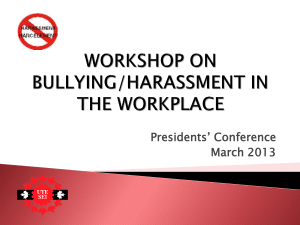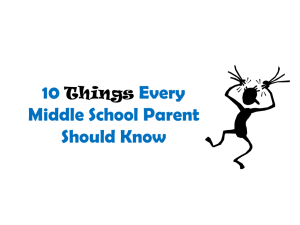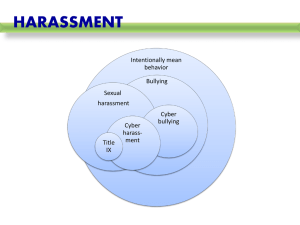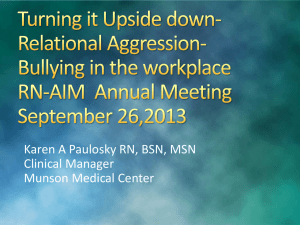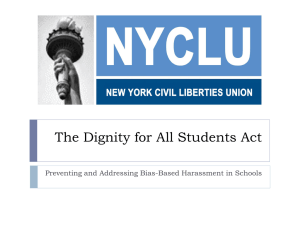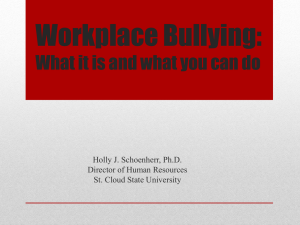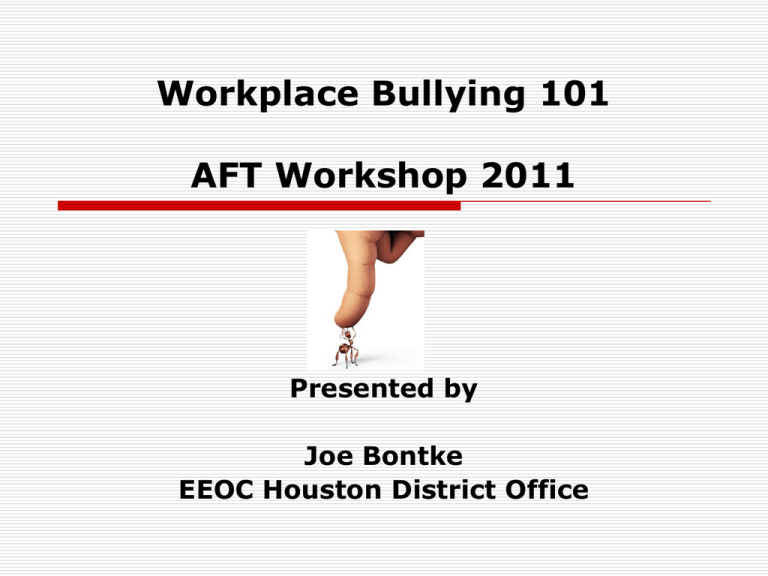
Workplace Bullying 101
AFT Workshop 2011
Presented by
Joe Bontke
EEOC Houston District Office
Where have I
seen him
before?
Workshop Objectives
Identify issues associated with
workplace bullying and how they
may turn into workplace complaints
Identify best route for resolution of
bullying complaints
Assess strategies before, during and
after an episode of bulling
Identify management and
workplace allies to deter and/or
resolve bullying issues
What’s in your “backpack”
It’s what we “bring”
It’s who I am
It’s my “stuff”
Obligations of Employers
Make the workplace free of unlawful
discrimination, harassment and retaliation
Promptly and confidentially investigate complaints of
discrimination, harassment and retaliation
Where discrimination, harassment and retaliation may have
occurred, take prompt and appropriate remedial action
(i.e., discipline commensurate with the offense)
Protected Federal Categories
Race
National Origin
Genetic
Information
Disability
Color
color
Religion
Sex
Age +40
When were you born?
Generational Groups
Traditionalists
(prior 1945)
Baby Boomers
(1946-1963)
Generation X
(1964-1980)
Generation Y
(1981-2000)
US Workforce Demographics
22%
(Gen Y)
33
million
43
million
7%
(Trad)
11
million
Traditionalists
Boomers
Gen X
Gen Y
63
million
29%
(Gen X)
42%
(Boomers)
Total Workforce: 150,000,000
Importance of Generations
There are a variety of things that help shape
our values ( it’s a backpack issue)
Historical events impact individuals and
generations
Differences in generations can create conflicts
inside the home as well as at work
Workplace Dynamics ?
Define these terms
Team player
Effective communication
Appropriate
Casual
Is Social Media A Fad?
http://www.youtube.com/watch?v=lFZ0z5Fm-Ng&feature=autofb
Workplace Bullying Defined
Repeated and unwanted actions by an
individual or group intending to intimidate,
harass, degrade or offend
Abuse or misuse of power
Bullying is psychological violence
Harassment of a Different Kind
Harassment comes from the French word
“Harasser” which literally means to “sic a
dog on someone” without provocation
Is Workplace Bullying covered
by EEO or HR?
The 3 primary avenues for workplace
disputes: HR, Union, EEO and if
you’re lucky – an ADR or CR Office
Unless the bullying actions specifically
involve a protected basis under EEO,
then it’s NOT covered by EEO laws,
but does that mean that you
should not address it?
What Does the Law Say?
EEO Law Protection
Harassment/Hostile Work
Environment
Retaliation
Workplace Violence Issues
Lawful v. Unlawful Bullying
What’s Covered by Federal
EEO Law?
Charges dealing with EEO Cases
Race
Color
Religion
Sex
National Origin
Disability
Age
*Hostile work environment
Retaliation
Must have previously engaged in
protected activity under Title VII, the
ADEA or the Rehabilitation/ADA
Includes participation through
testimony, investigation, at hearing
or litigation proceeding
Harassment
Can be either hostile work
environment or quid pro quo
Unwelcome verbal or physical conduct
based on one or more of an
individual’s protected bases under
Title VII, ADEA, ADA or other statutes
Bullying as EEO Discrimination
A hostile work environment consists of:
An unwelcome act that can be Physical or
Verbal behavior
Based on employee’s protected status
That is sufficiently severe or pervasive to
create a hostile, offensive or abusive work
environment
When can Harassment occur?
Before, During or After Work
Breaks
Lunch hour
Work-related events outside of
office, (i.e. happy hours, work
conferences, dinners, holiday
parties, picnics)
Bullying & Workplace Violence
Factor to Consider if an Individual
imposes a Direct Threat:
Nature & Severity of Harm
Likelihood that Harm will Occur
Imminent Fear or Intimidation
Your Workplace Violence Policy
Offensive Behavior
Remarks
Feelings
Behaviors
Anger
Resentment
Hurtful
What Pushes Your Buttons?
Workplace Examples of Bullying
Being shouted at or humiliated
Being the target of practical jokes
Blame without justification
Exclusion or social isolation
Physical intimidation (proximal)
Excessive micro-managing
Purposely withholding vital information
Examples (cont.)
Setting impossible goals for
subordinates to reach
Blocking potential training and
employment
Tampering with an employee’s
personal belongings
Removing areas of responsibility
without cause
The Effect of Bullying
Absenteeism
Decreased productivity
Manifestation of illness
High turnover
Increased accidents on the job
Violence
The Effects of Bullying…
When targets believe that they have been
bullied:
Some will cut back on work
Some will contemplate leaving the job
Only 10% do
Take it out on innocent family or pets
Others will steal from the job, sabotage
work, damage equipment, damage
personal property of the bully or
Contemplate a violent act and carry it out
Bullying is on the Rise…
According to a recent study by the national
Institute for Occupational Health and Safety
(NIOSH) bullying in the workplace is on the
rise.
24.5% of companies surveyed indicate
that bullying has taken place; 10.5%
involving bullying by external customers
More women are becoming bullies
Statistics on Bullying
37% of the workplace has been bullied
72% of bullies are bosses
57% of targets are female
Bullying happens four times more than
illegal harassment
62% of employees ignore the problem
The Dynamics of the Situation
We are in denial
We avoid the person for fear of escalation
We raise the issue with coworkers hoping
that they will do something about it
We surround ourselves with protection
from other coworkers for support and
reverse bully
We “check-out” at work; look for other
jobs
What Can You Do?
Before Situation Occurs
During Conflict
After Conflict
How to Deal with Bad Behavior
Try to address the underlying cause of
the behavior: I see you are very
stressed. Maybe I could help if you tell
me what’s bothering you?
If the conversation remains irrational,
then know when to quit
Recognize whether behavior is a
pattern or mishap, conduct or
performance; respond appropriately
From: The Civility Solution: What to Do When People
are Rude, St Martin’s Press, 2008
What Can You Do?
Ask yourself: Are you ready to stop whatever you’re
doing and take action to address it?
Recognize that bullying is about control
Realize that it’s not your fault
Keep a detailed diary and paper trail
Explore Resources – Internet, HR Policies, Union
Think about leaving division/organization
Conflict Management v Conflict Resolution
The I-R-O Method
Issue - What is the issue or
situation? What level of attention
does it deserve?
Response – What is appropriate
given your role and responsibility?
Outcome – What is your desired
outcome and what communication
strategies will best serve that goal?
How Should Complaints of
Bullying be Addressed?
What is the outcome that you seek?
To make the “bully” a better person?
Behavior modification?
Acknowledgement of an offense and apology?
Other?
Note: The aim of conflict resolution is not to
change the bully from the inside out, it is to
change or modify the behavior in the work
environment so that morale and production are
not impacted
“New Kid On The Block”
Rachel Matthews is a new teacher at for Anderson Elementary School. While she’s
experienced and graduated at the top of her class, she’s finding that during her first
month in her new position, she’s been given a “mentor” who is the team lead for 1st
Grade Classes. There’s definitely a hierarchy of sorts and she’s been having difficulty
with her coworkers who are all older. They are all married, have children and even the
one other single teacher in the group is only interested in talking about sports. There’s
one student teacher in the unit, but this person is only in the office twice a week due to
college. Her coworkers always call her “kiddo” and refer to themselves as “old timers”
to get out of “bad assignments” which require more after hours face time at the various
after school activities. They talk about the “good old days” when Teachers were
respected, tell stories about the previous Principal and all talk about retirement – which
is over 5 years away. Rachel doesn’t mind doing things to help out others or learn more
about the job and she even accepts that she’s the “new” one to the group, but she’s
been talking this situation over with her fiancée and he thinks this is discrimination.
She doesn’t like being called “kiddo” and getting all the “bad” assignments, nor being
dismissed by the others because of her age. Lately, she finds that these remarks are
more and more targeted to make her feel outside of the group – like making fun of
never having Records or using a typewriter - no matter what she does and has started
to call in sick more.
She recently did some searching online and brings this situation to your attention. She
thinks this situation is unfair and wants you to tell her what she should do? What do
you tell Rachel?
“The Devil Wears Prada”
Principal Williams is the best-dressed person in the school and even the entire district. Her
motto is “dress for success” and she believes in judging a book by its cover. She struts her
stuff down the halls during bell changes and everyone knows her by the clank of her Prada
heels. Her sharp dressed views are matched by her sharp tongue. Her management style is
command and control. She inspires fear in both students and this extends to Teachers and
staff. You have witnessed several verbal altercations
believes in Kenny is known as the quirky guy in the office. He wears ties that light up for all
the holidays and makes all kinds of bad jokes that no one ever laughs out. You know someone
from another division who once went out on a date with Kenny and he pulled a gag during the
date by putting a whoopee cushion in her chair. Your friend left the date and actually left the
division to get away from Kenny. Kenny comes to you to complain that there are two
individuals in the office who are abusive and mean to him. They walk away anytime that he
talks, have told him to put everything in writing and started spreading rumors about him, so
that now, others in the office are ignoring him too. He’s spoken with Ryan, the team lead, but
Ryan told him to “not let other’s get to him and just focus on the work product” but Kenny
can’t get anything done because people will not interact with him. His work is suffering, he
doesn’t like going to the office anymore and believes that his performance evaluation will be
marked lower. He recently heard that another employee went to HR to complain about him
and when he saw them in the parking garage he simply said “You better watch yourself” and
started humming some bad 80’s song “Why do I feel like somebody’s watching me” and
walked off.
Mary Beth is an employee who’s worked with Kenny for years, but has complained about
Kenny to you and states that his rude comments seem to be targeted to people like herself
who are “pleasantly plump.” He seems to think it’s all right to make fun of people and their
eating habits. Truth is, she was diagnosed with Diabetes last year and is eating better, but
that still doesn’t make it right to make fun of larger people. She describes the same scene
with Kenny in the parking lot and thinks he may be unstable and be violent.
If you are the local Manager, what do you do?
If you are the Union Steward, what do you do?
If you are HR/EEO, what do you do?
“Ragin Cajun”
Jimmy Boudreaux was a “super-4 star” manager for the Louisiana District
Office for XYZ and has now been assigned to one of the lowest performing
divisions in the southern Texas area. He volunteered for the transfer to
make more money and has a reputation in the other offices for being very
abrasive with staff. He’s over 12 employees in this new TX office and began
his first day by telling everyone how there’s a “new sheriff in town” and
things were going to change. He barks orders to all the staff, wags his
fingers in people’s faces and laughs out loud when he hears anything that
he thinks is funny, then changes his face to a serious look and says “bring
me a real idea next time” – all of which have only served to make
employees feel that they are working with a “Ragin Cajun.” In fact, Jimmy
once heard staff referring to him in the break room as that and walked in
and said “I like it!”, poured him some coffee and left with everyone’s mouth
wide open.
As Regional HR Director based in Dallas, you’re starting to get calls from
employees talking about a hostile environment. You speak with the
Regional Director and he comes immediately to Jimmy’s defense saying that
he hasn’t heard any complaints and only sees that the division performance
measures have improved 12% after only 5 months.
What do you do? What conversations need to be had with upper
management? What do you tell employees?
Keep in Mind
Conflict Happens.
Situations happen but work
should not hurt.
Remember: The only thing
you can truly control is how
you choose to respond.
What Can Managers &
Supervisors Do?
Create and enforce a zero tolerance policy
Address the bullying behavior ASAP
Hold an awareness campaign
If you are the bully…stop…seek help
Model effective professional behavior
Use Facilitation, Conflict Coaching, Mediation or
design a Group Intervention/Team Building or
Training Retreat
Continued Busy EEOC
99,922 Private Sector Charges: Most Ever
Retaliation – 36,258 charges
Race Discrimination – 35,890 charges
Sex Discrimination – 29,029 charges
Disability Discrimination – 25,165 charges
Age Discrimination – 23,264 charges
Sexual Harassment – 11,717 charges
National Origin Discrimination – 11,304 charges
Retaliation
EEOC statutes protect
individuals who
Oppose an unlawful employment practice
File a complaint, testify, assist or participate in
an investigation, proceeding or hearing
concerning prohibited discrimination
Request a reasonable accommodation (religion
or disability)
90% of education is
knowing where to find
the information when
you need it.
Joe Bontke
713 209 3436 office
713 907 2855 cell
joe.bontke@eeoc.gov email


